Hey all! After a long break over the summer, we are back with our regularly-scheduled dev diaries! Before we delve into today’s main topic, let me give you some info on what we will be doing next and how this dev diary fits into the overall scheme of things.
Way back in 2017, we released Death or Dishonor, something we called a Country Pack at the time. Back then, the community was mainly asking for big new flashy mechanics and revamps of game systems, so the initial reaction from the community was pretty mixed. In hindsight perhaps we shouldn't have been surprised :D. These days though we are bombarded with requests of more, better and bigger focus trees, and people are wondering if it's going to take 10 years to add trees to everyone? As a Content Designer, it has been very rewarding to see the community get more excited to see focus trees!
So we have decided to bring back the idea of a Country Pack, a smaller expansion that focuses on a specific part of the world and covering 3-4 minor nations. But at the same time, we didn’t want to put the entire team on it while there were still other parts of the game we wanted to work on such as adding an intelligence system. The idea is that this will let us increase how many focus trees and flavor we add while still being able to deliver big juicy features in larger expansions.
The approach we took was to recruit a freelancer to work on the focus trees while the rest of the team in Stockholm worked on the next big DLC, which would eventually become La Resistance. Today we are going to show you the first of the new focus trees coming in the next country pack, and in the coming weeks we will share more information on what other countries get focus trees in the pack, as well as what other content will accompany the release. As always, the country pack will be accompanied by a patch that will fix some bugs as well.
We think that this approach allows us to get more content to you faster, without taking resources away from the main team, which continues to work on the next big DLC. You will get more information on what that DLC contains after the country pack releases later this year (disclaimer: it is 2020 and fate can be fickle).
I’ll now hand you over to the man of the hour: Freelance CD Busby, working from Australia!
G’day, my name is Busby and I am the Freelance Content Designer who was responsible for putting together Greece and another soon-to-be-revealed mystery nation! ‘Freelance Content Designer’, I hear you ask, ‘how does that differ from your standard run-of-the-mill Content Designer’? Well, with COVID-19, those lines have certainly blurred; nominally, it means that I work remotely of the core team so I can focus on getting this pack out to you while they all collaborate on the next big expansion! Of course, I didn’t work alone, and you’ll be hearing from a familiar face who worked with me on this next week!
Before kicking things off, I just want to say as someone who used to read Hearts of Iron IV Dev Diaries on my lunch break in high school that it is an absolute privilege and an honour to be presenting you all with one of my very own! So, without further ado: Greece!

Greece was a very interesting challenge to tackle, they are well known for repulsing the Italian invasion of their nation and then successfully launching a counter-offensive of their own, which culminated in the Capture of Klisura Pass. So, it was important that Greece be able to play defensively, but it would also have been thoughtless to neglect what might be one of the world’s richest histories that shared in some of the grandest of accomplishments. Greece has been the beating heart of many historical empires, so they had to be capable of reaching their historical heights but without neglecting the many challenges that faced them at the time.

To say that Greece is in a challenging position in 1936 would be a great understatement. The Hellenic Armed Forces are the one positive in a sea of negatives, and even they’re woefully underequipped. Greece’s economic and political issues are represented through their starting national spirits:
- I am going to start first with Greece’s broadly encompassing Political Instability spirit. Greece was mired in political uncertainty throughout the entirety of the Great War, and although they were finally able to rally around the prolific political leader and vocal republican Eleftherios Venizelos for a time, this newfound stability was not to last. Greece decisively lost the Greco-Turkish War that immediately followed the Great War, and this loss sent shockwaves throughout the entire political scene: there were many coups, a dictatorship, and finally the Second Hellenic Republic came to a bitter end by November of 1935. In 1936, the country remains divided among those who believe in the institution of the monarchy, and those who are followers of the liberal democratic ideologue Eleftherios Venizelos.
- The restoration of the monarchy turned the Greek political situation on its head: King George II, exiled in 1923, is back on his throne while Eleftherios Venizelos hides in exile after being forced to flee the country in 1935. The status of King George II serves as the ‘hook’ for every political path in the focus tree, but that will be addressed shortly. For now, understand that King George II’s status as monarch of the Kingdom of Greece is precarious to say the least.
- The next four spirits are related to Greece’s economic situation, which is… not in a good state. Greece is buried underneath the tremendous debt it has accumulated over the past few decades, and this is represented through Greece’s Debt to the International Finance Commission spirit. If Greece wishes to free itself from the burdens of its debt, it will have to satisfy the three great powers holding the Greek economy hostage, and those would be the usual suspects: France, the United Kingdom, and the Kingdom of Italy.
- Greece’s colossal debt is only the start of Greece’s economic woes: Greece remains one of the only mostly agrarian economies in all of Europe by the game start, and this has spawned two issues: 1). Greece’s economy and working class are centered around their agricultural sector rather than the nation’s industrial output, and 2). Greece’s agrarian economy has led to a dependence on foreign nations to supply their heavy industry for Greece’s construction needs. Greece’s industrial paths are focussed on nullifying these issues while also rapidly modernising the country so Greece is able to still compete with its neighbours.
- But it’s not all bad for Greece, for they have a continental guardian angel to assist with their crippling economic hardship… Germany! Yes, the Schachtplan, a clever mechanism that gives the Germans a higher degree of control over the country’s finances and natural resources, but when you’re struggling as hard as Greece you take any form of reprieve you can get - even if it is ultimately serving German hegemonic aims in Europe.
Now, I know these debuffs seem rough - perhaps even discouraging - but every negative national spirit can be removed or mitigated through Greece’s focus tree, which you can see here!

We shall be going through the focus tree from right-to-left, like an old Japanese novel!
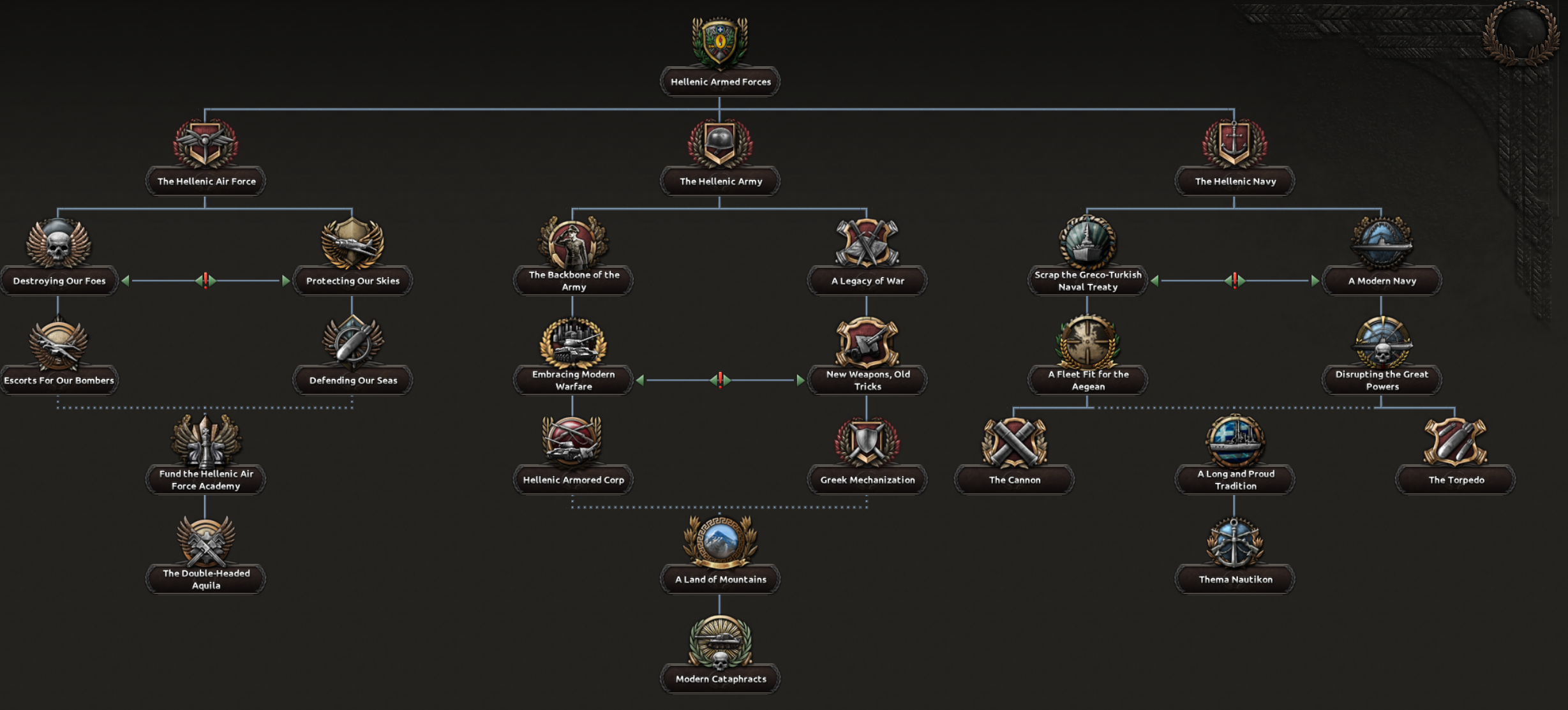
Greece can often find itself wanting for manpower so most Greek games aren’t going to be about amassing large armies but rather about fielding a smaller, professional army. The same applies to Greece’s navy and air force, but with the right sponsor who’s to say Greece couldn’t put one of its decommissioned battleships back into action?
Each armed forces branch offers at least one permanent national modifier that helps ensure Greece can set up a successful defensive game even if it can’t muster the manpower or equipment for a large army. The Hellenic Academy Battleplans should help quite a great deal in this!
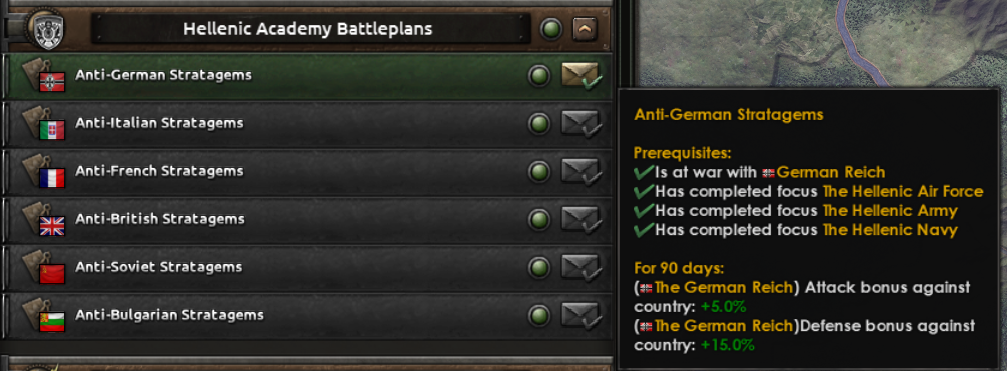
Greece can preemptively draw up defensive plans against the major powers of Europe as well as its smaller but no less threatening neighbours. These temporary boosts to defense, and even to attack in some cases, should ensure Greece can successfully hold any frontline so long as they aren’t being faced with an overwhelming force - very much like real life! Next, let’s look at how you can get your industrial base to match the level of excellence of your armed forces.
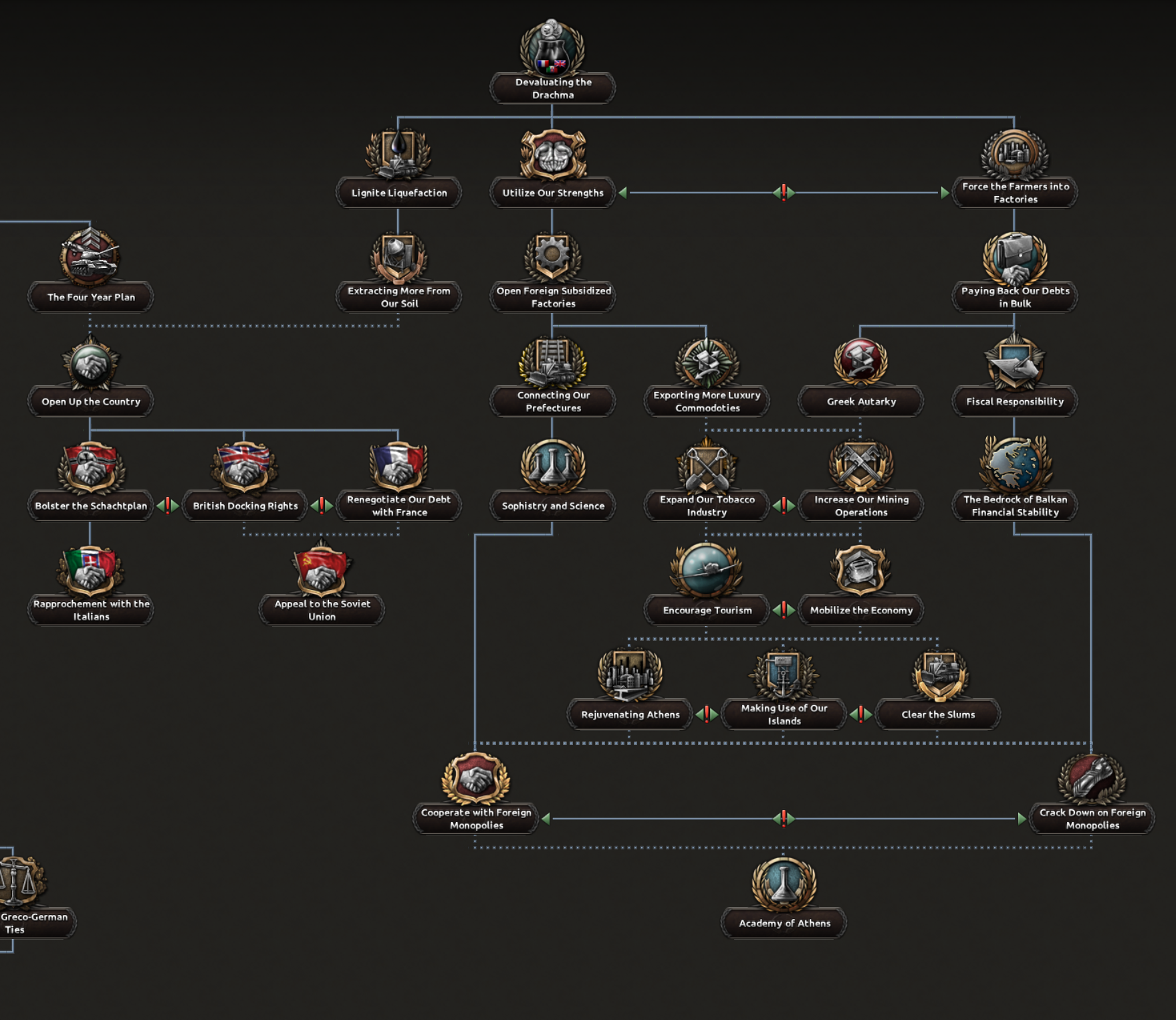
Greece’s industrial path is your one-stop shop to access the means of eliminating those pesky national spirits that Greece starts with. The first focus, which is 35 days, unlocks the ability to chip away at that pesky Debt to the I.F.C. through decisions.

Greece immediately unlocks the ability to make small debt repayments after finishing the first industrial focus, and other options can be unlocked along the way. The forced industrialisation path, for example, offers a faster route to getting rid of the Debt to the I.F.C. spirit by unlocking large debt repayments - and while they are more resource intensive than small debt repayments, they can clear a debt away very quickly. Of course, if Greece happens to fall under the influence of a regime that doesn’t quite play by the established rules of the liberal democratic world then there will of course be other roads opened up to circumvent the nasty capitalist plot to ruin the Greek economy!
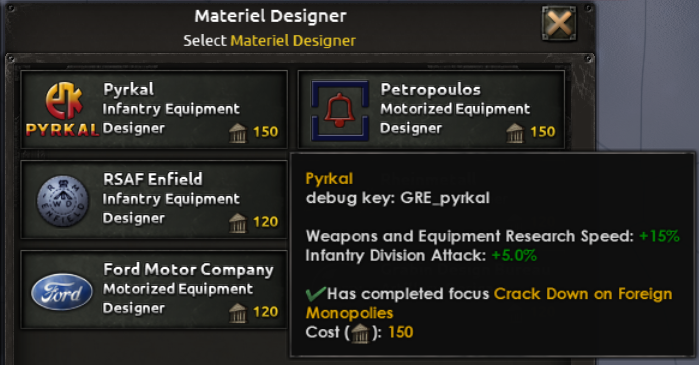
Greece’s two branching paths in the industrial path allow the player to choose how the Greek economy modernises: they can either double-down on their service economy and use Greece’s large commodity export sector to enrich the nation using the means of the outside world, or they can force their farmers off their farms and into the cities so Greece can be brought fully into the twentieth century. As the path progresses, the effects of the Foreign Monopolies spirit will be lessened and lessened until finally they can be abolished or co-opted to the benefit of the Greek state. Greek national companies, which require the Foreign Monopolies to be banished, apply better modifiers but the foreign companies are cheaper and ultimately easier to attain.
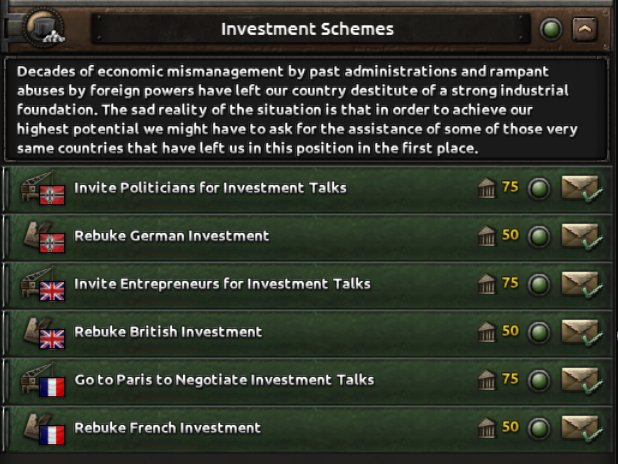
Next up are the investment focuses: the middle ground between the industrial branches and the political tree. Investment is a nifty way to spend any spare political power in the pursuit of free factories courtesy of your ally or sponsor. It would be wise to show restraint, however, for the sponsoring country will take on a pretty hefty penalty while they prepare to fulfill any pledges they’ve made to Greece.

Ah, and now we get to the real meat of the tree: the politics. The first big choice of the game comes in the very first month via either a focus or decision, where the player will have to decide whether to place the king under arrest to prevent him from meddling in the election or allow him to forcibly establish a governmental mandate for the monarchists.

Let’s start with the historical path, where the monarchists win their election and the king appoints former officer and arch-enemy of the republicans Ioannis Metaxas as prime minister and soon-to-be-dictator.

The Metaxist path is all about trying to maintain your neutrality for as long as possible so you can take all the Metaxist focuses which provide some tremendous national buffs that all go away the moment Greece enters a faction. The exception is if the player reaches the end of the Metaxist branch by finishing Reviving the Spartan Warrior Spirit before they join a faction. Of course, the player doesn’t have to wait that long - they can go straight to the Allied path on the left or transform Greece from a quasi-fascist dictatorship into a full-blown fascist regime.
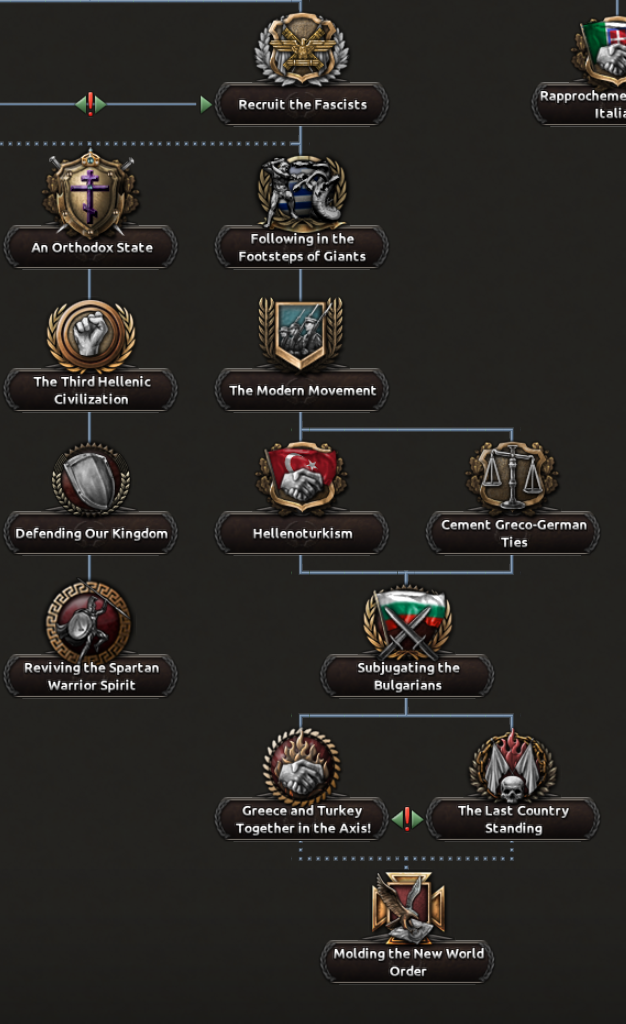
The aim of the fascists is not only to bring themselves closer to the Axis, but to pressure Turkey into joining the war as an equal ally and partner. To achieve this aim, the player can choose to either appoint George Mercouris or Ioannis Metaxas as their fascist dictator. Of course, there’s always the chance negotiations could be sabotaged, giving the Greek player the opportunity to act counter to Germany’s wishes by forcing the Axis into a conflict with the Turkish regional power. Perhaps that might not be so bad, because while Metaxas is fixated on crafting his Third Hellenic Civilization Mercouris has a decidedly fixated obsession with the First Hellenic Civilization…
But let’s return to Metaxas, because even though he was a Germanophile it must be said that not every member of the Axis has Greece’s best interests at heart.
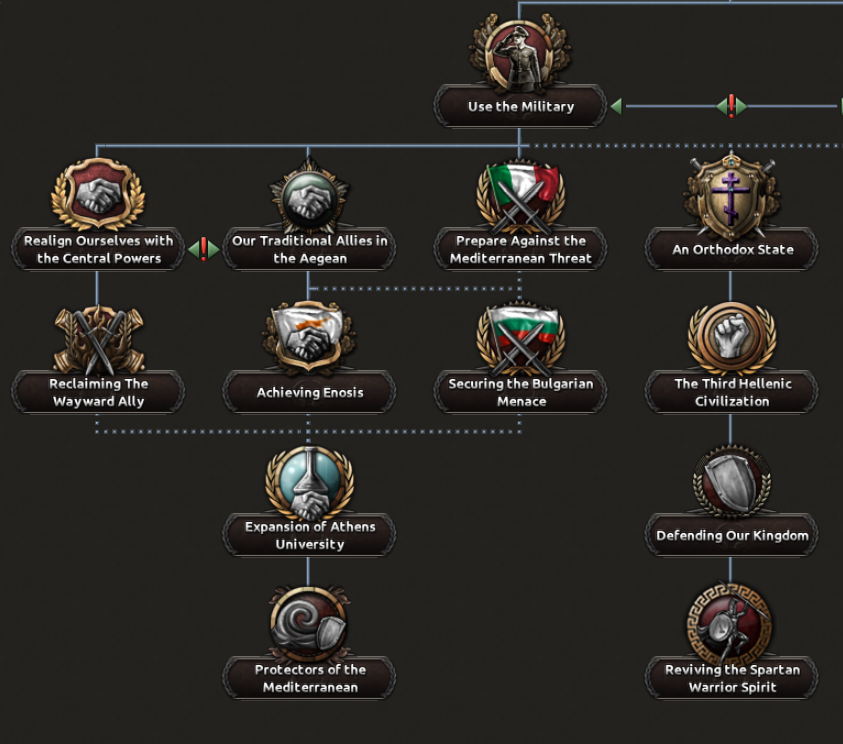
Strange times call for strange bedfellows, and despite Metaxas’ fascist leanings he is free to align Greece up with its historical allies in the Mediterranean: the British Empire. Once the overtures have been made, Greece will be free to get down to the business of Cyprus and the facilitation of a change in administration of the island. But Metaxas isn’t the only possible would-be Allies member in the King’s administration…

...so let’s talk about the Anglophilic King George II himself! Perhaps Metaxas just isn’t going to cut it for Greece, perhaps what Greece really needs is a strong monarch who can serve as a beacon of stability and hope for the Greek people! Of course, the people aren’t going to see it like that - in fact many of them are going to really hate the government’s guts.

Years of instability and infighting shall culminate in a triumphant civil war between the monarchists and the republicans! It’s perhaps not the most delicate solution, but a good civil war really does have the habit of ironing out a nation in contempt of itself. Take on King George II as your absolute monarch and assist the British in scourging fascism from Europe, or alternatively perhaps a good bit of that fascism has already been purged away and the Central Powers have been reborn. Well, in that case link up with your royalist brethren and fight together to protect the divine right of kings!

Political Instability keeps coming up as a concept, so let’s look at the spirit. Greece is divided into four factions: the Monarchists, the Republicans, the Communists, and the Fascists. They’re all pretty hateful of each other, but there was also a common consensus that Greece needed to be strong and united in the face of a global catastrophe (like a World War). Not every leader saw it that way, *cough* Metaxas *cough*, so there will be three primary ways of dealing with political instability.
First, to progress the spirit and lower its debuffs it's necessary for progress to be made down the political tree - every ideology has its own unique Political Instability spirit but although the modifiers change the universal principle remains the same.
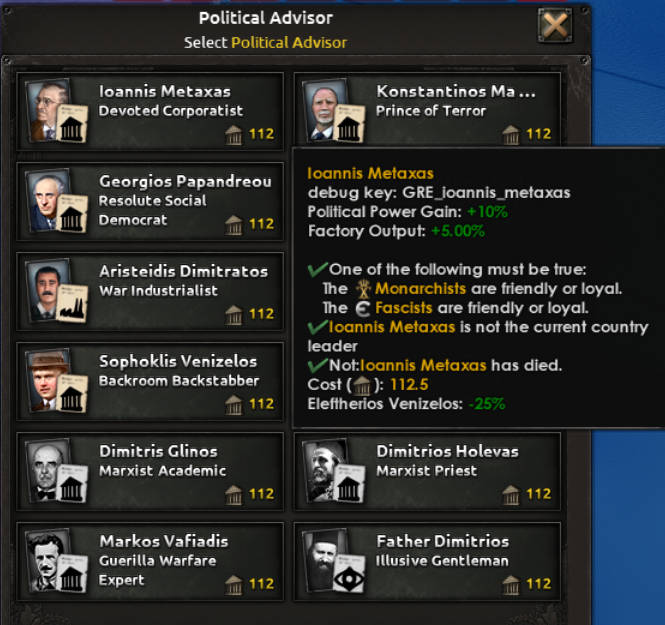
The player can choose between smashing a faction and negating the negative debuffs applied to the nation by having a hostile faction, or they can go the longer and more expensive route of co-opting a faction and making them an ally. Generally, the more allied factions the better because more allies means more manpower and more ministers, but sometimes the resources required to commit to such an act would be better spent elsewhere preparing for external threats rather than internal ones.
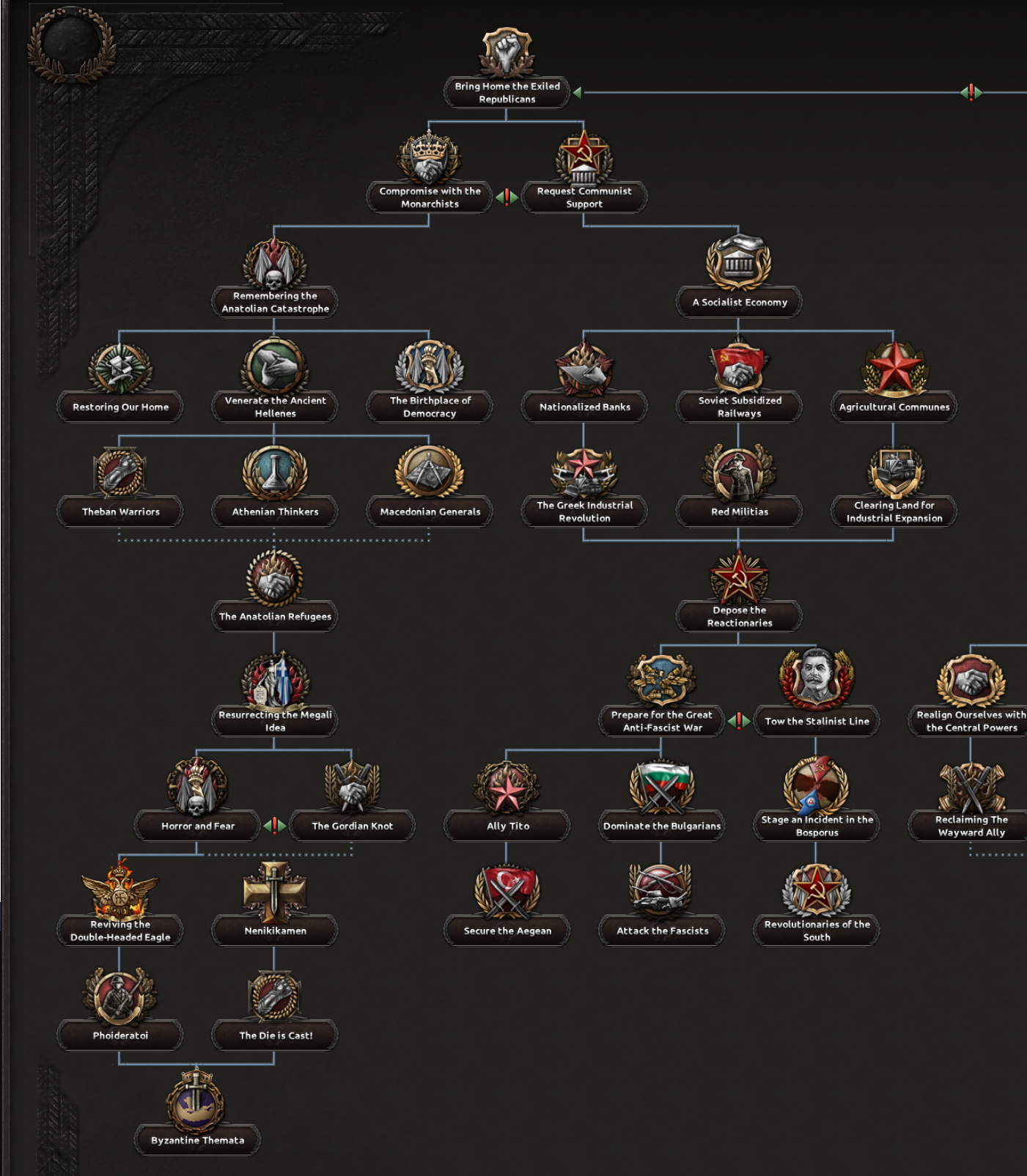
Speaking of factions, how about some insight into the most incongruous of factions - the communists! Communism, being allied with the concept of republicanism, requires the Venezelists to seize the election. Once that is done, they can choose to ally together with the communists so that a Third Hellenic Republic can be reborn. However, as you can imagine the communists aren’t really content with anything short of… well… full-blown communism.

Of all the branches, the communist one perhaps adds the most in terms of industrial potential for Greece: while all those other sucker ideologies focus on culture and heritage, the communists focus on more material achievements. Although, would it really be a communist branch without a doctrinal split near the end?
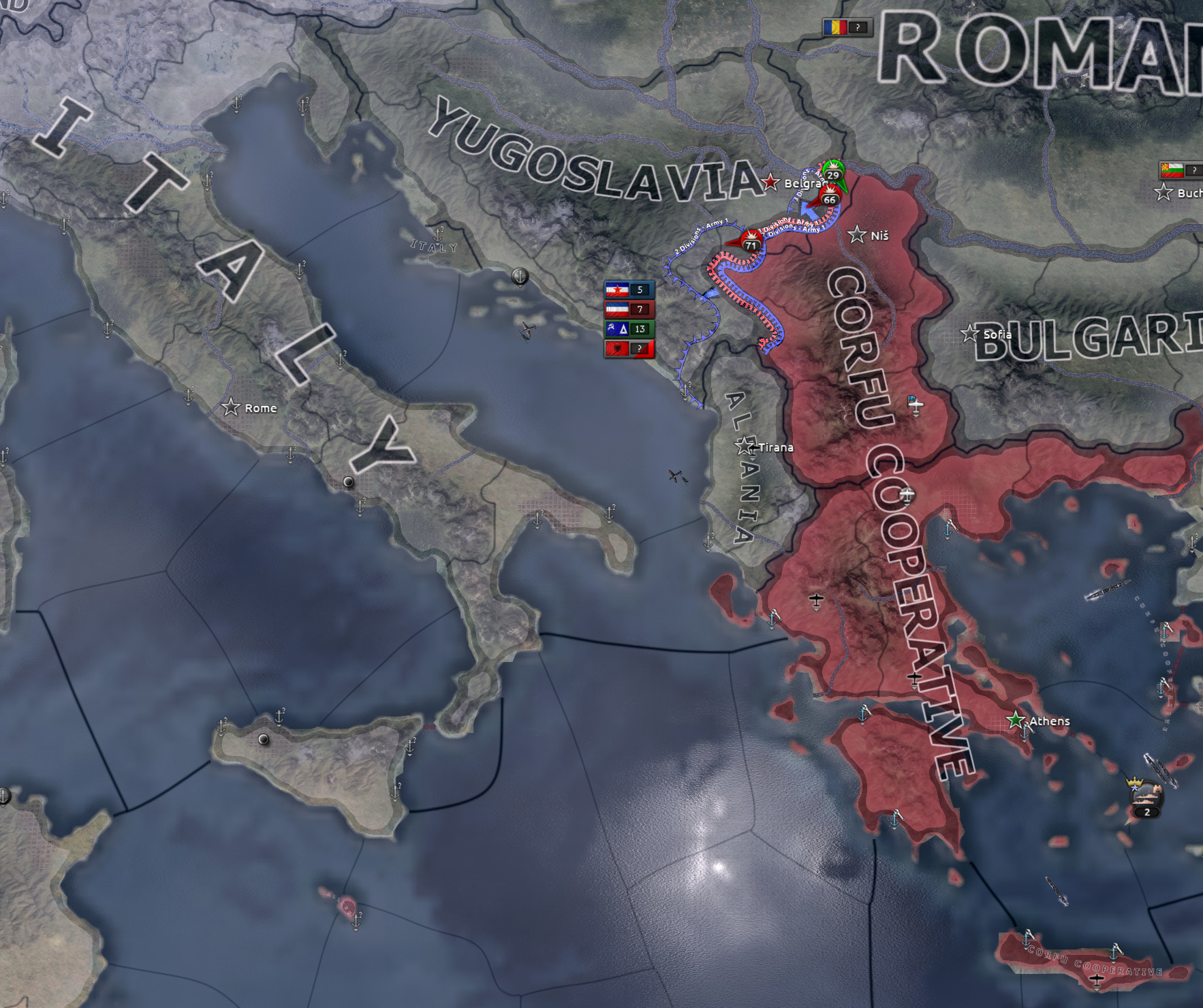
Take the nation under the wing of the uncompromising revolutionary Markos Vafeiadis, and assist Josip Broz Tito in his ascent to power in Yugoslavia as you prepare to tackle the fascist menace in Europe. Or perhaps you’re a little more loose with your Marxist morals; perhaps Stalinism doesn’t seem so bad after all! Chairman Nikos Zachariadis is your man!
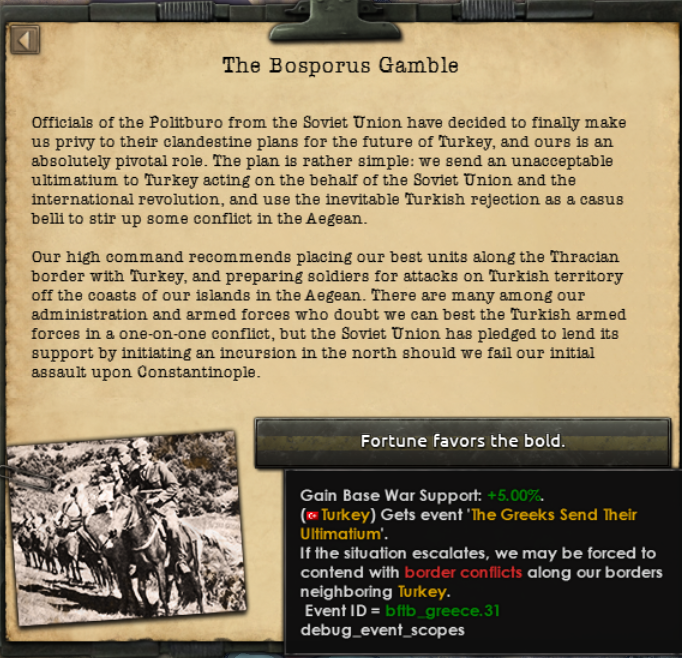
Why waste precious resources fighting fascism when you can leave that to the capitalists! Your objective, like your theory, is based on practicalism and not idealism. Orders from Moscow dictate that the Bosporus must be taken at any cost. To fulfill Stalin’s whims, a crisis must be started - one border conflict shall escalate into another, and before the world knows it Southern Europe will be red from Corfu to Kars!

...well, that might be all fine and dandy for everybody whose favourite colour is red, but we’ve got one last path to discuss! Yes, yes, the so often spurned democratic path - but even though this path comes last it is certainly not least! Few parties were as influential in Greece’s history between 1910 and 1936 as Eleftherios Venizelos’ Liberal Party, and it was important to me that the player felt some weight playing as these titans of Greek politics. Although, if the Venezelists were titans then Venizelos himself was a colossus. This is reflected in his Ethnarch trait, which provides some much needed manpower and stability - but utilise him while you have him, for he is not long for this world!
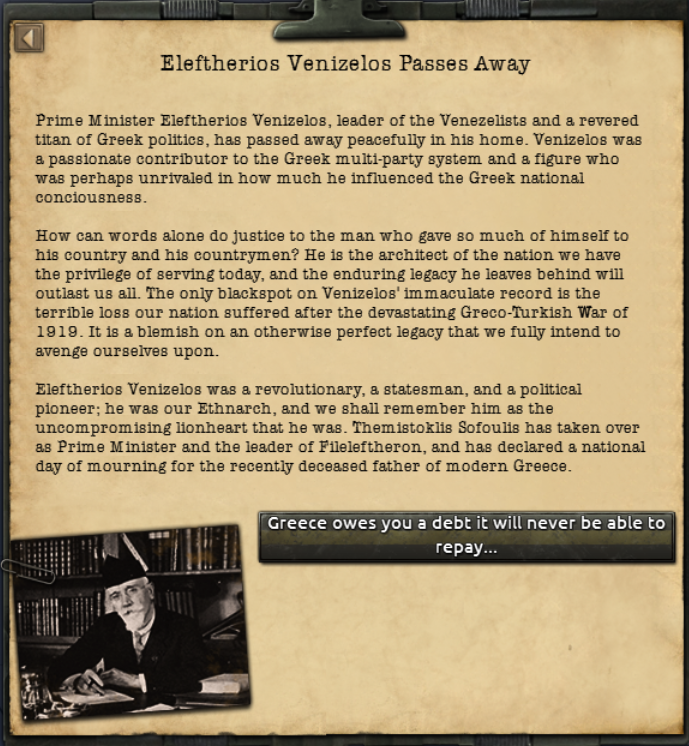
Something that sets Greece’s liberal democratic party apart from many others is that warmongering is a core part of their doctrine. The Venezelists were staunch believers in the Megali Idea - the irredentist dream of a Greater Greece incorporating many parts of modern day Turkey. The Venezelists made a grand attempt to fulfill the Megali Idea after the Great War… it led to the Greco-Turkish War… which, to put it mildly, did not end well for the Greeks. They were decisively defeated by the Turkish Kemalists, and the Hellenic Republic fell apart shortly afterwards.
When you restore the Venezelists, you inherit their shattered legacy - the only way to restore the reputation of Venezelism is to couple yourself with the monarchists, fulfill the Megali Idea, and avenge the terrible loss the Greek nation endured. But not everybody in Greece believes the Venezelists deserve a second chance…
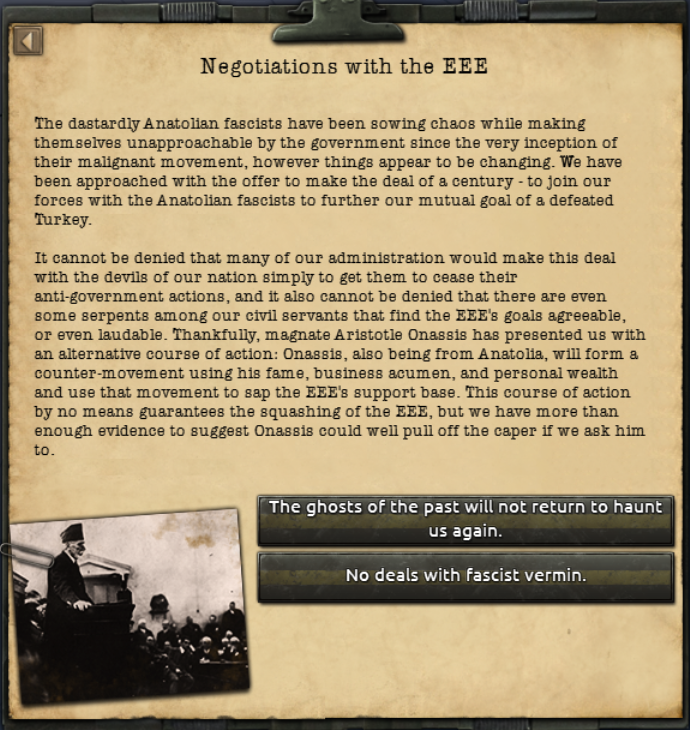
Enter, stage left: a new breed of fascist, Ethniki Enosis Ellados. The EEE collapsed in 1935 due to infighting, but with the reemergence of the Venezelists they have found new purpose: to unite the millions of Greeks who were exiled from their homes in Anatolia after the Greco-Turkish War, and to oust the government that led them into defeat last time. The EEE is a ‘no half measures’ movement, to them the Megali Idea is not worthy of the paper it was written on - when it comes to reclaiming territory from Turkey, it must be all… or nothing.
Playing as the Venezelists, the EEE are going to be a serious thorn in the side of any government trying to effectively unite the country, and before the Megali Idea can be addressed the EEE must be dealt with. There’s a particularly famous and talented young man who was also an exile from Anatolia, and it might be expedient to encourage him to form a counter-movement to thwart the nascent EEE. Or perhaps the player wants to see the EEE in government, well, the option to take them into a coalition is certainly available - although the consequences of this course of action will be on your head…
Once the EEE are out of the way, it will be time to call on the original Treaty of Sèvres signatories so that a frank discussion on the future of the Turkish state can be had. The end result of a particularly fruitful Heraklion Convention is truly a sight to behold.
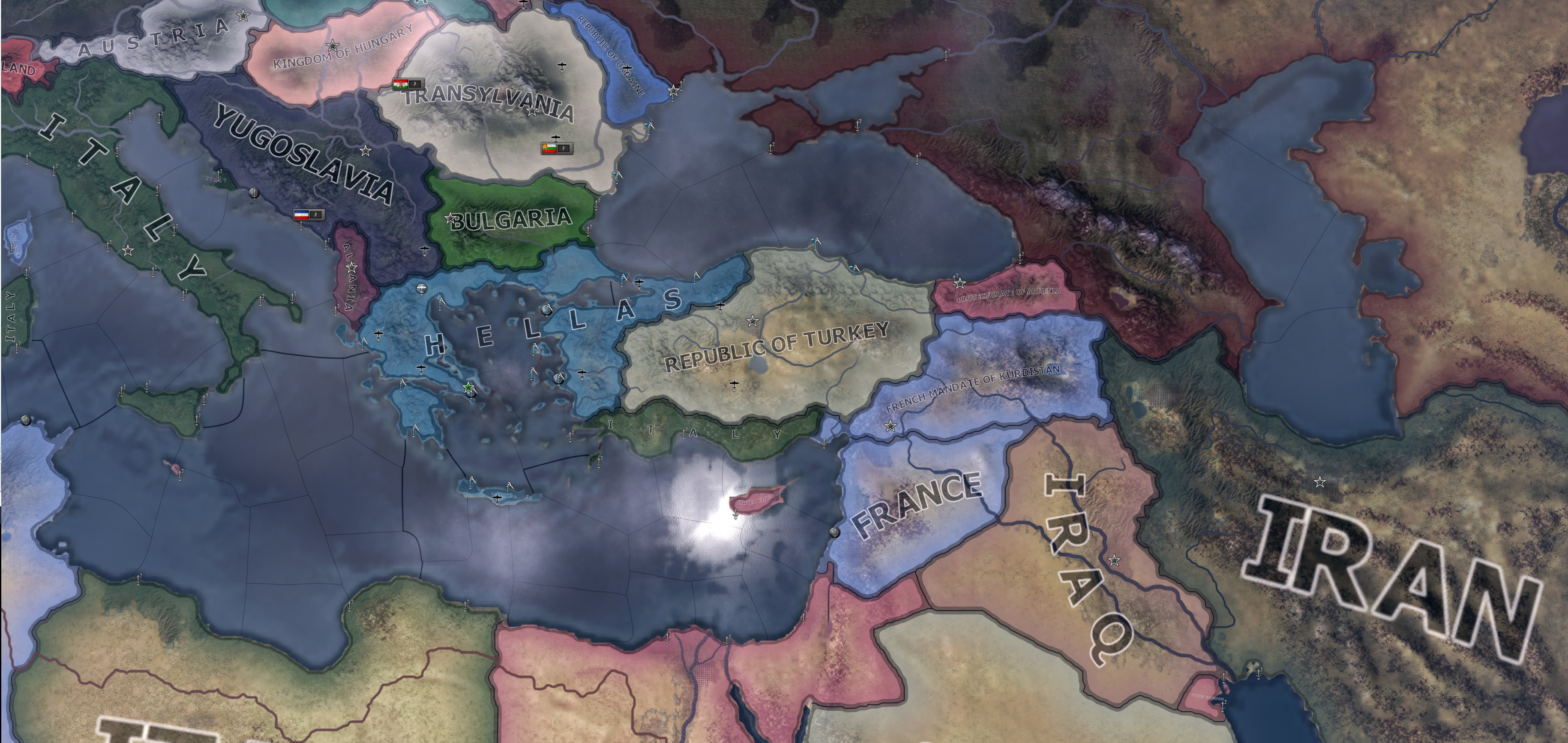
But should the Venezelists fail… should their legacy be trashed once again, and their leaders thrown out of office… well, that could be a truly dark day for Europe indeed…
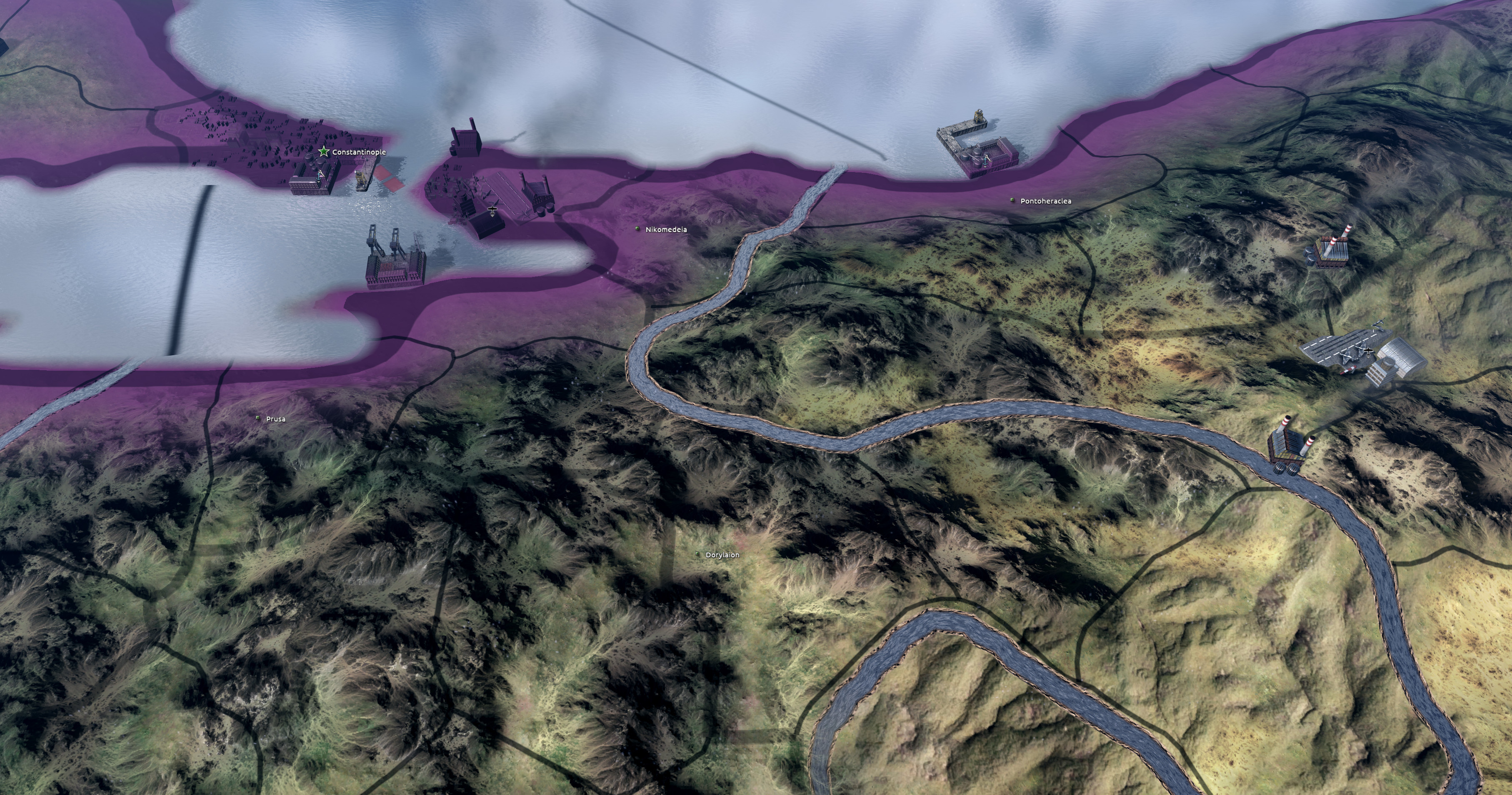
That’s all for this week, so thank you for reading! Make sure to stay tuned for another Dev Diary next week!


























